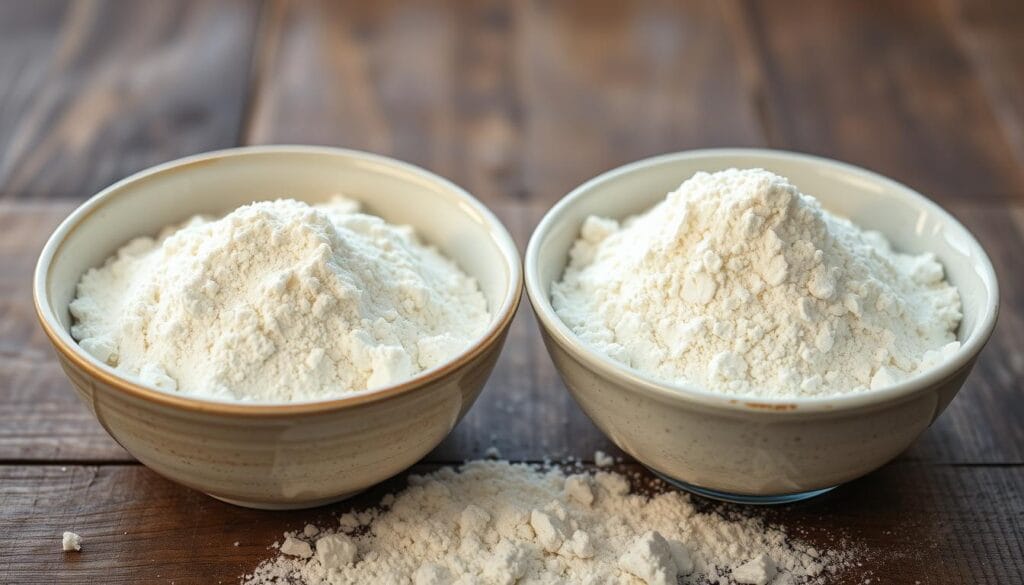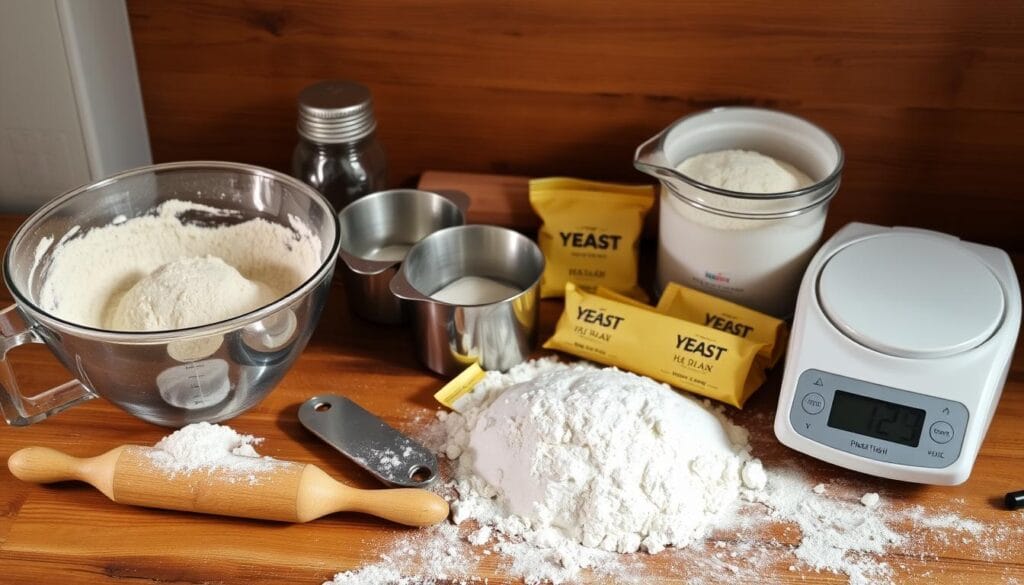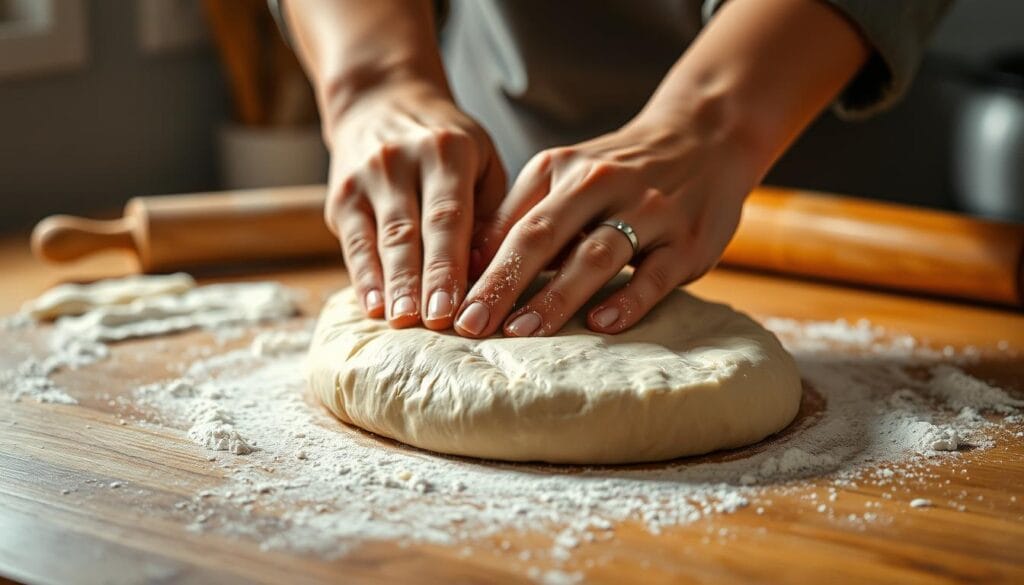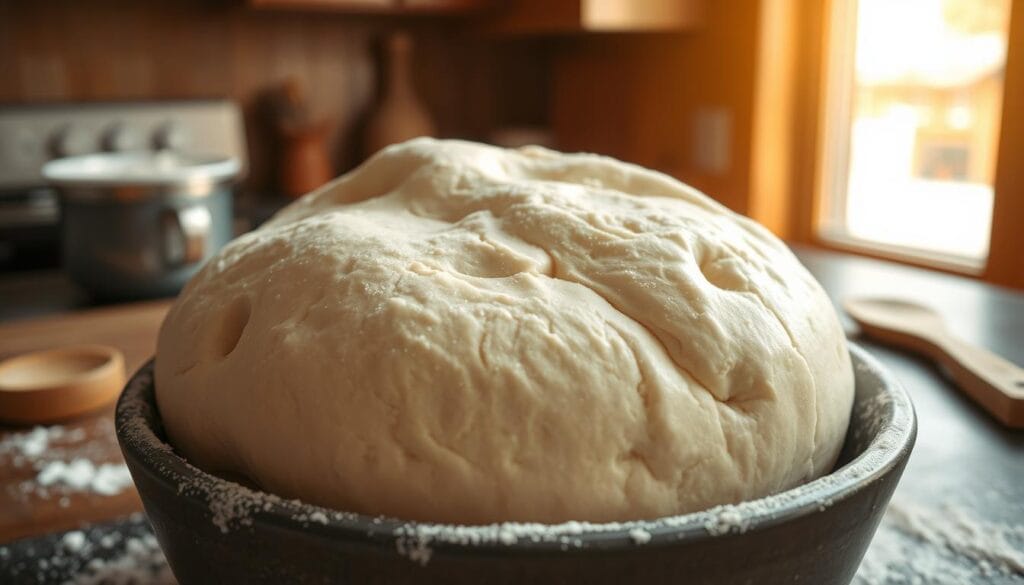Imagine the smell of fresh bread in your kitchen. The soft, fluffy texture feels amazing. Making homemade sandwich bread is a joy, and this easy recipe will help you get started. It’s perfect for grilled cheese or toast.
Starting to bake bread might seem hard, but it’s easy once you know how. This recipe makes two 9×5-inch loaves of soft white bread. You’ll need simple ingredients like flour, yeast, honey, water, salt, and olive oil. This bread is easy to make and doesn’t need dairy or eggs.
Table of Contents
Understanding the Basics of Homemade Bread Making
Making homemade artisan loaves might seem hard, but it’s easier with the right bread making equipment and knowledge of bread ingredients. You can become a skilled home baker. Let’s explore the basics for making great sandwich bread.
Essential Bread Making Equipment
Starting your bread-making journey requires a few key tools. A stand mixer with a dough hook makes kneading easy. You’ll also need loaf pans to shape your bread and a bread lame for those special crust slashes.
Key Ingredients Overview
The main bread ingredients are flour, yeast, salt, and water. Flour gives structure, yeast makes it rise, salt adds flavor, and water holds it together. You can also add oil, honey, or milk for a softer, richer bread.
Basic Bread Making Terminology
Learn some key bread-making terms before you start. Proofing is when the dough rises and gets flavor. Kneading develops gluten for structure. Fermentation is when yeast makes the dough light and airy. Knowing these basics will help your sandwich bread turn out perfectly.
“The smell of good bread baking, like the sound of lightly flowing water, is indescribable in its evocation of comfort and delight.” – M.F.K. Fisher
Why Make Your Own Sandwich Bread
Baking your own sandwich bread has many benefits. It lets you control what goes into your bread. This way, you can make it healthier and taste better.
Homemade bread avoids additives and sugars found in store-bought bread. Freshly baked bread from your kitchen uses better ingredients. You can choose unbleached flour, real butter, and honey for sweetness.
Also, making your own bread saves money. Homemade bread benefits include big savings, up to $10 a week. You get two loaves, enough for your family. You can also freeze some for later.
Baking your own bread is rewarding. The smell of fresh bread is amazing. It’s a simple joy that makes meals better and brings your family closer.
“There is nothing like freshly baked bread to bring people together and nourish the soul.”
Essential Ingredients for Perfect Sandwich Bread
To make the ultimate sandwich bread at home, you need just a few key ingredients. The secret to a soft, fluffy, and flavorful loaf is in the right mix of flour, yeast, and salt. Let’s explore the essential parts that make this homemade bread special.
Types of Flour and Their Effects
For the best results, mix bread flour and all-purpose flour. Bread flour’s high protein content builds a strong gluten structure. All-purpose flour adds to the tender crumb. Together, they create the perfect texture for sandwich bread.
The Role of Yeast and Salt
You can use either instant yeast or active dry yeast in this recipe, adjusting the proofing time as needed. Salt is key, enhancing flavor and controlling yeast growth. It ensures the loaf rises perfectly.
Optional Enrichments
To enhance your homemade sandwich bread, consider adding olive oil, honey, or a bit of sugar. These ingredients add softness, tenderness, and a hint of sweetness to the bread.
Understanding each ingredient’s role helps you bake the perfect sandwich bread. Your family and friends will love it.

| Ingredient | Purpose | Recommended Brand |
|---|---|---|
| Bread Flour | Develops gluten structure | King Arthur Baking |
| All-Purpose Flour | Contributes to tender crumb | King Arthur Baking |
| Instant Yeast | Leavening agent | Fleischmann’s |
| Active Dry Yeast | Leavening agent | Fleischmann’s |
| Kosher Salt | Enhances flavor, controls yeast | Diamond Crystal |
| Olive Oil | Enriches texture and flavor | Extra Virgin |
| Honey | Enhances sweetness | Local or Organic |
| Sugar | Feeds the yeast | Granulated |
“The key to perfect sandwich bread is finding the right balance of flour, yeast, and salt. With a few simple tweaks, you can elevate your homemade loaf to new heights.”
Kitchen Tools and Equipment Needed
To bake homemade sandwich bread, you need some basic tools. Start with a stand mixer with a dough hook or a big mixing bowl for kneading. A 9×5″ loaf pan is perfect for making classic sandwich bread.
Having measuring cups and spoons is crucial for accurate measurements. A bread lame or sharp knife is needed for scoring the dough. This step helps create a beautiful, artisanal crust.
Using metal loaf pans is recommended for even heat distribution. This is better than glass or ceramic pans.
A kitchen scale is not essential but very helpful. It ensures your ingredients are measured precisely. This small investment can greatly improve your bread’s consistency and rise.
| Tool | Average Price |
|---|---|
| Oxo Stainless Steel Food Scale | $56 |
| Kenwood 5-Quart Chef Titanium Kitchen Machine | $550 |
| Original Danish Dough Whisk | $14 (with $8 discount) |
| Cambro Camsquare Food Container | $19 |
| OXO Bench Scraper | $12 (Amazon/Target), $13 (Wayfair) |
With the right bread making tools, you can make delicious homemade sandwich bread. It will be just as good as store-bought.

Step-by-Step Mixing and Kneading Process
Learning to mix and knead is key for making great sandwich bread. You can use your hands or a stand mixer. This guide will show you how to do it well.
Hand Kneading Technique
Start by mixing dry ingredients like flour, yeast, and salt in a big bowl. Then, add wet ingredients like water, milk, and oil. Mix until it forms a shaggy ball.
Put the dough on a floured surface. Start kneading by pushing the dough away with your heel, then fold it back. Keep doing this for 8-10 minutes. The dough should be smooth and slightly sticky.
Stand Mixer Method
Using a stand mixer is easy. Add dry ingredients to the bowl, then wet ingredients. Use the dough hook to mix until it forms a ball.
Once the dough is ready, turn up the speed to medium. Knead for 3-5 minutes. The dough should be smooth and elastic, stretching without tearing.

Mastering the Art of Dough Fermentation
To get the perfect rise and texture in your homemade sandwich bread, you need to master dough fermentation. After kneading, shape your dough into a smooth ball. Then, place it in an oiled bowl, covered, to let it rise. This first rise, called bulk fermentation, is key for the bread’s structure and flavor.
During this rise, yeast does its magic, making carbon dioxide and changing the dough. Experts say to let the dough rise in a warm, draft-free spot for 1-2 hours. It should double in size. This lets the yeast ferment the dough well, making it light and tasty.
To help fermentation, keep the dough’s temperature between 100°F and 110°F. This temperature is just right for yeast to work well. If it’s too cold, yeast works slow. Too hot, and yeast dies, stopping the bread dough rising process.
“Proper yeast fermentation is the key to achieving the perfect texture and taste in your homemade sandwich bread.”
The team at Modernist Bread at Home stresses the importance of rising the dough in a covered, oiled bowl. This keeps the surface moist and ensures even rising. By mastering dough fermentation, you’ll make the perfect homemade sandwich bread.

Shaping Your Sandwich Bread
Making the perfect sandwich bread starts with shaping the dough. This step is key for the bread’s look and feel. It affects the texture and structure of your homemade bread.
Creating the Perfect Loaf Shape
After the dough rises, gently flatten it and shape it into a rectangle. Fold the top corners to the center and then roll it tightly from top to bottom. Place it seam-side down in your loaf pan. This method makes a uniform loaf that bakes well.
Common Shaping Mistakes
Watch out for common mistakes in shaping. Not sealing the seams or shaping unevenly can cause gaps. Make sure to roll the dough tightly and seal the seams well for a professional look.
Learning to shape bread is key to making great sandwich bread at home. With practice, you’ll get better at it quickly.
| Shaping Technique | Effects on Bread Characteristics |
|---|---|
| Pan Loaf Shaping | Provides added structure, allowing for increased hydration to make the bread softer. The author prefers not to score pan loaves to control the rise in the oven. |
| Baguette Shaping | Offers a thin crust and a high crust-to-crumb ratio due to its shape, but can be challenging for home bakers due to smaller oven sizes and restricted proofing alternatives. |
| Batard and Boule Shaping | Involves specific techniques that contribute to the outer appearance, crumb structure, and slice characteristics of the final product. |
Shaping the dough is a vital part of bread-making. It comes after dividing and pre-shaping and before the final proofing. By mastering bread shaping, you can make delicious, attractive loaves. These will enhance your homemade sandwich bread experience.
The Second Rise and Proofing Tips
After shaping your sandwich bread dough into a loaf, it’s time for the final rise. This step is key for developing the bread’s structure and texture. Cover the loaf and let it rise in a warm place for 50-60 minutes. This could be your oven with the light on or near a sunny window.
The dough should crown over the pan when ready. To check, press a floured finger into the dough gently. If the indentation slowly fills back, it’s proofed right. This ensures your bread will be light and airy.
But, be careful not to overproof or underproof. Overproofing can make the loaf collapse, while underproofing makes it dense. The proofing time can change based on the dough’s temperature, hydration, and recipe. Watch your bread closely and use visual and tactile cues to know when it’s perfect.
FAQ
What are the essential ingredients for making homemade sandwich bread?
What equipment do I need to make homemade sandwich bread?
How do I knead the dough properly?
What is the importance of the first rise and dough fermentation?
How do I shape the dough into a perfect loaf?
How do I ensure proper proofing of the shaped loaf?
What are the benefits of making your own sandwich bread?
Source Links
- Homemade Soft Sandwich Bread – Lion’s Bread – https://www.lionsbread.com/perfect-soft-sandwich-bread-recipe/
- Easy White Sandwich Bread – https://thebusybaker.ca/easy-white-sandwich-bread/
- The Ultimate Bread Baking Guide: How to Make Bread from Scratch – https://www.tasteofhome.com/article/bread-baking-guide/?srsltid=AfmBOor6w-E2dhnpV_2VV4l2xLjVg7lkySK89rbbZtAI8iVvLjQblikq
- Easy Sandwich Bread (Baking Bread For Beginners ) – Savas Kitchen – https://savaskitchen.com/easy-sandwich-bread-baking-bread-for-beginners/
- Ultimate Guide to Homemade Bread – https://thestayathomechef.com/homemade-bread/
- Sandwich Bread – https://baranbakery.com/sandwich-bread/
- Soft and Fluffy Sandwich Bread Recipe: Your Guide to Perfect Homemade Loaves – https://generationacresfarm.com/soft-and-fluffy-sandwich-bread-recipe-your-guide-to-perfect-homemade-loaves/
- Healthy Homemade Sandwich Bread that Kids Love – Done With Diligence – https://donewithdiligence.com/sandwich_bread/
- Easy Soft Sandwich Bread in a Loaf Pan (For Beginners) – https://thepracticalkitchen.com/soft-sandwich-bread/
- Country White Sandwich Bread, Best White Bread I Baker Bettie – https://bakerbettie.com/country-white-bread/
- After Baking More Than 100 Loaves, These Are the Tools I Swear by for Amazing Homemade Bread – https://www.foodandwine.com/cooking-techniques/baking/bread-baking-tools
- My Highly Curated Baking Tools | The Perfect Loaf – https://www.theperfectloaf.com/my-baking-tools/
- Soft White Sandwich Bread – I Cook And Paint – https://icookandpaint.com/soft-white-sandwich-bread/
- The PERFECT Sandwich Bread! – https://thesaltedpepper.com/homemade-sandwich-bread/
- Sandwich Bread Recipe: 10 Simple Steps to Bake Your Own Delicious Loaf – https://recipewealthy.com/sandwich-bread-recipe/
- Master the Art of Baking with Modernist Bread at Home – Finding Focus – https://positivepix.net/2024/07/08/master-the-art-of-baking-with-modernist-bread-at-home/
- How to Shape a Pan Loaf (Sandwich Bread) | The Perfect Loaf – https://www.theperfectloaf.com/guides/shaping-a-pan-loaf/
- The Ultimate Guide to Shaping Bread Dough | The Perfect Loaf – https://www.theperfectloaf.com/guides/shaping-bread-dough/
- The Ultimate Guide to Proofing Bread Dough | The Perfect Loaf – https://www.theperfectloaf.com/guides/proofing-bread-dough/
- Soft Sourdough Sandwich Bread – https://littlespoonfarm.com/soft-sourdough-sandwich-bread-recipe/
- Simply Sandwich Bread (Recipe + Video) – Sally’s Baking Addiction – https://sallysbakingaddiction.com/sandwich-bread/comment-page-32/


1 thought on “Best Homemade Sandwich Bread Recipe for Beginners”
Comments are closed.